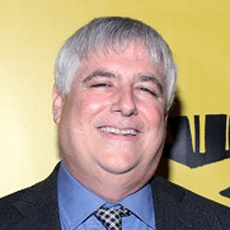Jeremie Noyer literally jumps right back to Ariel’s beginning as we come towards the end of our exclusive Little Mermaid interview series. Still to come is a tribute to Ariel’s lyricist Howard Ashman, but today he’s speaking with none other than lyricist Glenn Slater: composer Alan Menken’s new collaborator in bringing the original 1989 animated classic to the Broadway stage. So take a dive under the sea for a sneak peek at Disney’s latest magical, musical extravaganza!
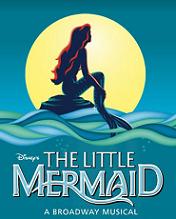 From Beauty and the Beast to The Lion King and Mary Poppins, Disney Theatrical Productions has always shown its expertise in adapting movies (most of them animated) to the stage, each time pushing the limits of what’s possible to do in a live environment.
From Beauty and the Beast to The Lion King and Mary Poppins, Disney Theatrical Productions has always shown its expertise in adapting movies (most of them animated) to the stage, each time pushing the limits of what’s possible to do in a live environment.
Making a Broadway show out of Disney’s classic The Little Mermaid was an unprecedented challenge. As director Francesca Zambello reflects, “You want to think, ‘how can I make it, not better, but make its theatrical life unique?’ Which is why you bring on board all your collaborators, your designers, choreographer, musicians, all working to answer this question: ‘how will we make it unique for the stage?'”
Among these collaborators was lyricist Glenn Slater (Home on the Range, Sister Act: the Musical) whose attempts were arguably doubled by the fact that he had to not only bring something fresh to the classic score, but also remain true to the film’s original lyricist Howard Ashman’s intentions.
As you shall read, for his first Broadway production, Glenn [below right, with Alan Menken] proved to be no fish-out-of-water, and truly succeeded in getting into “part of that world”…
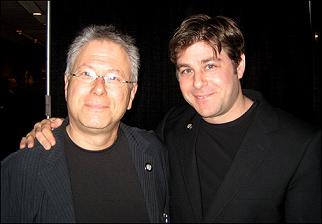
Animated Views: When did your stage journey under the sea begin?
Glenn Slater: I started working on the show in 2001. I had been working with Alan on the Roger Rabbit sequel and on Home on the Range. When the idea of a Broadway version of Little Mermaid came up, Alan turned to me, I think, largely because he felt that he needed somebody that would be able to capture the tone that Howard Ashman had brought to the piece, that mix of both comedy and wit and emotional connection. It’s a project that is possibly closest to Alan’s heart and it was very important to him to find the right lyricist. So, it was a huge honor that he entrusted me with that. We began very closely looking at the songs that he and Howard had cut from the original film, as sort of a guide as to where to go, and took off from there.
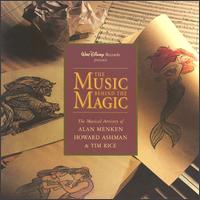 AV: How were the storylines and the book of the show developed?
AV: How were the storylines and the book of the show developed?
GS: Well, at the time, there was a different director and a different book writer. There was some songs which they had demoted from the original film, that are currently on a CD set called The Music Behind The Magic: an extended version of Fathoms Below, a song for Ursula called Silence is Golden, I think a few other things as well, that we sort of used as our starting point, to sort of see where Howard might have gone with it. Much of what we were doing in those early days survived to the final version. Then, the show did take some plot twists and turns that are slightly different, some characters have been conceived slightly differently. So, not everything that we did back in those days survived. I think there is probably about twenty songs that we wrote in the early days that never made it to the final version of the show.
AV: How different is the final version of the show from the animated film?
GS: Ursula has a different back story in the final version and much of the second act of the show is different from what we were originally thinking it would be. Originally, we were staying quite close to the film for the end of the show. But it became quickly apparent that it was going to be extremely difficult, if not impossible, to do what the film was doing on stage. I would say probably the last third of the film is basically an extremely cleverly done chase scene in which Ariel is going through the water to get to the ship, and the seagulls are helping her out. It’s a lot of action, with one character chasing another character. If there’s one thing that movies do fabulously well, it’s chase scenes, and there’s one thing that theater does extremely poorly, it’s chase scenes. Everything that we were trying to do just seemed like a confusing welter of movement. It was sort of hard to follow. Even more difficult with Little Mermaid by the fact that no only was it a chase scene, it was a chase scene that took place in air, in water and on land, with characters that ranged from extremely small to extremely large. So, we were never quite able to solve how to pull that off and we left it more or less blank for quite a while, until Francesca Zambello, our director, and our design team came on board with some solutions.
AV: How was your collaboration with the team?
GS: Disney Theatrical is extremely blessed by having at its head Tom Schumacher, who is one of the smartest and most knowledgeable people working in theater right now. So, what we were able to do was have somebody at the very top of the entire production, working out over every aspect of it and making sure that everybody was working together well, that we had the resources to follow whatever idea we might have had. Basically, the way it would work is that, our director would have some ideas, and the book writer and myself and Alan would try to figure out how to execute those ideas. Tom Schumacher would keep an eye over everything to make sure that everything was proceeding in a way that would make the property itself shine on stage and keeping in line with what everybody’s expectations for The Little Mermaid were. It was a hugely collaborative experience, with every arm of the collaboration being extremely smart and extremely dedicated to making the best show they could possibility make, and extremely helpful to each other in making that happen.
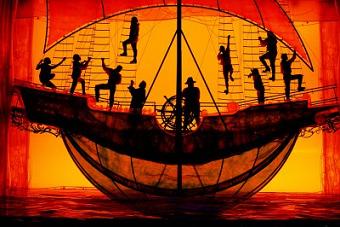
AV: You told me about capturing the tone Howard Ashman originally brought to the piece. How did you manage that?
GS: Let me set back for a moment. The original film of Little Mermaid came out while I was in college and just starting to write for the theater. When I saw that film, and listened to songs like Part of Your World and Kiss the Girl, it was like if a lightball went on for me: that’s how you write a ballad. Instead of making it sentimental and generic, Howard has always managed to find a way to use the sentiment with wit, to infuse the pathos with comedy, to find a way of using the most specific language possible to create the most universal feeling. It’s a combination of heart and mind, working together to create one thought that feel completely original. That was what I was aiming to do: a certain way of writing a phrase, with the courage to go directly to the heart of emotion and then combine them in a way that feels fresh.
In order to help capture his specific voice, I spent a lot of time just reading and re-reading the lyrics, listening and re-listening to the songs. It was a little difficult to do in that a lot of places where we added songs are places where you wouldn’t have put songs in the film, because it would have slow down the film. But we did need to have songs to make the show work. In some cases, it was impossible to get back completely to what Howard necessarily would have done because the circumstances had changed somewhat. Where I think I was most successful is in the reprises and additions to already existing songs such as Poor Unfortunate Souls or Fathoms Below. There’s also a reprise of Les Poissons. In those cases, I was very quickly able to get a sense of the types of words he would have used, the rhythms of the words he would have used, the sorts of colloquial expressions that he would have used and I think we came up with with things that are almost exactly like what he would have done.
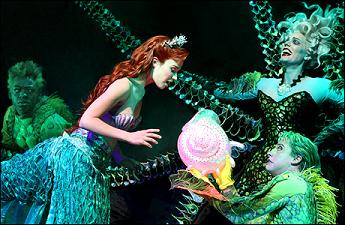
For some of the newer songs, take for example the song that the Prince sings in the show, Her Voice. It feels much more like a big, soaring Broadway ballad than something that Howard might have done. That’s partly because, if Howard had wanted to write a song for the Prince in the movie, he would have found a way to make that song a little less sentimental. But since what we were working on was the character that already existed, there didn’t seem to be quite as much opportunity to go for the “Ashmanesque” whimsy in that song, and so, it feels much more like a Broadway ballad.
AV: Scuttle’s song Positoovity reminded me of the kind of lyrics the Sherman brothers used to invent, like Fortuosity and things like that. Did you have that kind of references in mind when writing this title?
GS: Yes, absolutely. There’s a great tradition of Disney songs that are based on nonsense words. I’ve always loved those Sherman brothers songs. With Scuttle, his character trade is that is tends to mangle ideas and language while being utterly convince that what he’s saying or doing is completely correct. So, it seemed like a good opportunity to have him take a piece of language and play with it in a “Scuttlesque” way. It seemed like a great opportunity to give Little Mermaid a Supercalifragilistic type of song that could be a signature for that character.
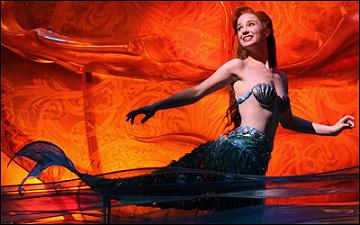
AV: Can you tell me how you approached Ursula?
GS: Obviously, Ursula’s big scene is her song Poor Unfortunate Souls. The way that it works out in the Broadway show, that song would be the Act I Finale. But the idea of having a major character played by a major actress who doesn’t sing at all until the very end of the first act seemed bizarre. Especially since that character would have to appear several time on stage without being introduced by a song. So, it was decided very early in the process that we needed to write something for Ursula that would introduce her character close to the beginning of the show. Now, one of the problems that we faced was that Poor Unfortunate Souls tells us almost everything we need to know about her. So, as far as the story goes, whatever the earlier song did, we had to had to get this little insight into her back story and psychology.
We had originally written a song for that spot called Wasting Away, which came directly out of a scene from the film. It was written much more in the style of Poor Unfortunate Souls. It had a sort of Kurt Weill, Weimar, Germany sort of feel to it, much the way her ritornel from the movie does. But it was felt that that song, while it sounded great on CD, didn’t have enough happening in it to become an interesting stage number. When Sherie Rene Scott was hired to play the character, it was realized we had wonderfully gifted comedian and fantastic singer, somebody who could create a real entertaining production number in that spot. So, we wrote a song for her that would let her use the full range of her talent in a great number. However, what seems to be comedy, played in major keys, masks sort of the heart of Ursula is. So, even though it might seem like a happy-go-lucky number when you hear, there is an undercurrent of scariness beneath that helps serve the character quite well.
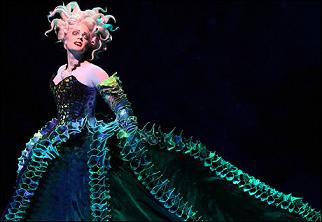
AV: How did you deal with the scenes when Ariel has lost her voice?
GS: As you know, Ariel loses her voice at the end of the first act and doesn’t speak or sing for the rest of the film until the very end. In a Broadway show however, to have a character who doesn’t sing makes her a little bit invisible on stage. So, we thought that one way to deal with that would be to get her a song that would be in her head rather than something that she would sing out loud, so that we could get some sort of insight into what she was thinking and feeling.
We had originally written If Only for the evening of her first day on land, after the first night that she sees the Prince and they meet and they have dinner together. The idea was actually go back to her room. She and Eric would have a short conversation in which she realizes that he did not understand what she was thinking and feeling and she would sing the song in her own head as he held a one-sided conversation with her. It was subsequently felt by everybody that having her sing when she has no voice was a trick that we would to save for the most emotional moment of the second act rather than that early on. So, we moved that spot where she sings about the fact that Eric doesn’t understand her feelings back until the evening of the third where she’s about to lose him forever.
 Once we had it in that spot, we realized that it was an emotional high point for several characters, where several story lines were all coming together. So, we wrote a reprise of that number for Sebastian, to tie up his storyline, and for Triton as well, to tie up his storyline. We had them lined up one after another. And our director, who comes from the opera world, said: “this works perfectly fine but how brilliant would it be if we found a way to have all four of those voices combined at once in a quartet where you could literally hear the plotlines twisting together?”, which seemed like a fantastic idea to us. So, Alan and I went off and he did a fantastic job of creating a piece of musical drama that was thrilling just to hear without any words. And then I went in and I helped tease out these characters’ storylines and twist them together in such a way that they all peak at the same point and conclude, leading us at the end of the show.
Once we had it in that spot, we realized that it was an emotional high point for several characters, where several story lines were all coming together. So, we wrote a reprise of that number for Sebastian, to tie up his storyline, and for Triton as well, to tie up his storyline. We had them lined up one after another. And our director, who comes from the opera world, said: “this works perfectly fine but how brilliant would it be if we found a way to have all four of those voices combined at once in a quartet where you could literally hear the plotlines twisting together?”, which seemed like a fantastic idea to us. So, Alan and I went off and he did a fantastic job of creating a piece of musical drama that was thrilling just to hear without any words. And then I went in and I helped tease out these characters’ storylines and twist them together in such a way that they all peak at the same point and conclude, leading us at the end of the show.
AV: As you stressed it earlier, Part of Your World is certainly the ultimate Ashman/Menken ballad and wishing song. Was it difficult to write ballads in the same vein like The World Above or If Only that were to gel together with that beautifully classic song?
GS: Yes! You know, I’ve now watched the Little Mermaid film about fifty times, I would say, and every time I watch it, I’m struck by the fact that it is virtually perfect. There’s not wasted word, there’s not a wasted line, every bit of dialogue and lyric, either colors in the character or pushes forward the plot or creates a joke or a detail is brought back to play an effect later in the film. It’s almost perfectly composed and anytime you take something that feels perfect and bring it into another medium or change it, you approach that with a lot of trepidation because you’re always worried about ruining what’s there. However, you also realize that when you translate it into a new medium, that new medium has different demands.
When we began working on this, it became apparent very quickly that Ariel’s what-we-call “I want” song, which is Part of Your World, which tells us everything we need to know about Ariel, doesn’t happen in the film until about half an hour. In a Broadway show, the idea of having a lead character whom we need to identify with instantly not sing anything until that moment in the show seemed unworkable. So, we needed to get her something to sing earlier in the show. That was the same problem that we ran into with Ursula. We know everything we need to know about that character from what they sing in a song so, we tried to find a way to have them sing earlier.
 With Ariel in particular, Part of Your World is such a defining moment that there didn’t seem to be anything we could say earlier that would add anything to the character. So, what we did with The World Above was to try to create a moment where we get a sense of Ariel’s feeling that she doesn’t belong where she is. But because she has not yet seen the Prince, that feeling of not belonging is not yet attached to a person. It’s not an idea that we wanted to stay with for a long time because there’s not that much to say about it and she says everything she needs to say with Part of Your World. So, we created just a sort of mini-song, a little introduction.
With Ariel in particular, Part of Your World is such a defining moment that there didn’t seem to be anything we could say earlier that would add anything to the character. So, what we did with The World Above was to try to create a moment where we get a sense of Ariel’s feeling that she doesn’t belong where she is. But because she has not yet seen the Prince, that feeling of not belonging is not yet attached to a person. It’s not an idea that we wanted to stay with for a long time because there’s not that much to say about it and she says everything she needs to say with Part of Your World. So, we created just a sort of mini-song, a little introduction.
In the earlier version of the show, her song, The World Above, was echoed in Fathoms Below by the Prince when he sings about the sea using the same melody, and then it was echoed later by Triton telling her that she shouldn’t feel that way, that the sea is her home. In that earlier version, this melody was not meant to serve as a separated song per se, but as a motive that was repeated by several characters in the early part of the show to give us a sense of how several characters get into their respective worlds. But for storytelling purpose, all of that fell away but the version of it that Ariel sings still does a wonderful job of setting up who that character is before the Prince arrives.
AV: Did the fact that director Francesca Zambello comes from the opera world had any input on the way things happened?
GS: Obviously, most of her experience is in opera and she’s had massive success with opera. But she did the Aladdin show at Disney’s California Adventure, which is a musical. She has several other shows that had been in production. So, she didn’t come to it never having done that before. Francesca is, I think, a wonderful dramatic storyteller, and that skill is applicable in any of the performing arts. She brought all of her knowledge about how to tell a story, how to pace a story, how to make characters come across, about the role of set design, the role of lighting design. All of that came together into this project and I think she was quite good at that!
AV: Did the design of the show inspire you one way or another?
GS: Well, when we began working on the show, we wrote songs for several years before Francesca came on board and, as I mentioned earlier, we were having a lot of problems figuring out how to solve some of the challenges that translating the show from the film to the stage implied. For the early stage of the writing, we had no idea what the staging would be, and often we would write something down and say: “well, they enter. We don’t how they enter. On wires? Walking? But they enter and then they sing and then they exit, but we don’t know how they exit.” We were in the dark, so to speak.
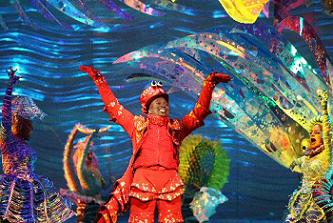
Once Francesca came on board, she had a very, very clear vision of what the show needed to be and she had Tom Schumacher’s 100% agreement in how to push the story forward. So, once she let us know how she saw the show, then we were able to go back and re-think several moments, re-think how the characters moved, re-think how they talked. And once we knew what the design and aesthetics was going to be, a lot of things changed. Not so much of the songs elements, but it influenced the music somewhat. Everything has a sort of glow now to it that had to be captured by the music as well. But for the most part, I believe that the design of the show was designed around what the songs were going to be rather than the other way around.
AV: The show was first presented in Denver and then brought to Broadway after some changes in costumes and design. Were there any alterations on the musical side of things?
GS: Yes, absolutely. The ending of the show changed quite a bit. The version that we had in Denver proved to be a little bit unsatisfying and so we ended with up an ending that has a lot more emotional resonance. Several songs were cut, Human Stuff is about half the length it was originally, and we added some material to I Want the Good Times Back, to make it a little more of a production number, and a lot of the reprises in the second act because we felt that the flow of the song and spoke material wasn’t quite right yet. So, we moved those pieces around a bit. In general, once we saw in Denver where audiences were with it and where audiences felt confused or unsatisfied, we were able to go back and shape it a little bit with lyrical and musical changes as well.
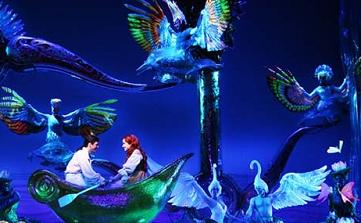
AV: Did you get feedback from Howard Ashman’s family, his sister Sarah Gillespie and his companion Bill Lauch?
GS: I didn’t have a huge amount of contact with them but I know Alan did and I think that were generally quite happy with the way it worked out. They were very concerned that what Howard had written would stay Howard’s. We made absolutely certain that we did not change a word that Howard wrote. And why would you, because every word that he wrote was quite wonderful! It is sort of heart and soul of what The Little Mermaid is.
AV: What will you keep from your debut on a stage show?
GS: For me personally, as my first Broadway show, it’s been an invaluable experience in going through the journey of having ideas on paper that grew up to a quite enormous Broadway production. It’s been a fantastic experience in that we had to really push ourselves and challenge ourselves and adapt to a rapidly changing situation. I think we managed to come up with some fantastic stuff. Certainly, the experience of having gone through this is informing the experience I’m having on the other shows that we are working on now.
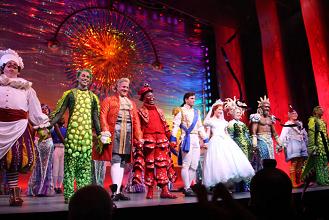
AV: So, what are you working on presently?
GS: Well, with Alan, we have been working on Sister Act, which is going to open in London in June of 2009, and we’ve been working on Leap of Faith, which looks like it’s going to open in New York in the Fall of 2009. So, that’s been keeping us busy. I’ve been working with Andrew Lloyd Webber on the sequel to The Phantom of the Opera, which is to open in London in the Fall of 2009. Then, I’ve also been working on a project with Danny Elfman, which I can’t say too much about right now, but it’s really exciting!
is available to buy now from Amazon.com

With our sincerest gratitude to Glenn Slater for taking time out from his exhaustive schedule, and his great kindness!
Disney’s The Little Mermaid on Broadway is now running at the Lunt-Fontanne Theatre, 205 W. 46th Street, New York. Visit the official website for showtimes, tickets, song snippets, video clips and much more!



